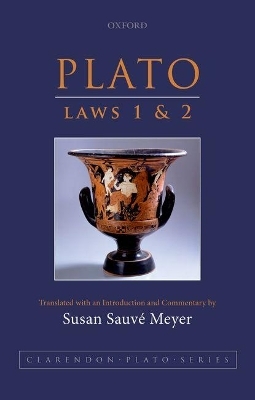
Plato: Laws 1 and 2
Seiten
2017
Oxford University Press (Verlag)
978-0-19-960409-8 (ISBN)
Oxford University Press (Verlag)
978-0-19-960409-8 (ISBN)
Susan Sauvé Meyer presents a new translation of Laws, 1 and 2: the opening books of Plato's last work, which discuss legislative theory, moral psychology, and aesthetics. This fluent, readable, and authoritative translation is accompanied by a critical commentary which explores the argument's structure, and the philosophical issues at stake.
Susan Sauvé Meyer presents a new translation of Plato's Laws, 1 and 2. In these opening books of Plato's last work, a Cretan, a Spartan, and an Athenian discuss legislative theory, moral psychology, and the criteria for evaluating art. The interlocutors compare the relative merits of different nomoi (laws, practices, institutions), in particular, the communal meals (sussitia) practiced in Sparta and Crete and the paradigmatically Athenian institution of the drinking party (sumposion). They agree that the legislator's goal is to inculcate virtue in the citizens, but they disagree about what the virtues are, and what institutions are required to inculcate them. The Spartan and Cretan, who value military strength in a city and courage in its citizens, see no value in drinking parties, which they take to encourage softness and susceptibility to pleasure. The Athenian insists that drinking parties train citizens in moderation, just as military exercises train citizens in courage. He defends this paradoxical thesis by offering a moral psychology and theory of virtue (rather different from that of the Republic but highly evocative of Aristotle's Ethics), along with a theory of education in which choral song and dance play an important role. A detailed discussion of the criteria for evaluating works of art rounds out the discussion, and here too the reader will find a discussion very different from the treatment of art in the Republic.
Meyer's fluent and readable translation achieves a high standard of fidelity to the original Greek. The commentary lays bare the structure of the argumentation, illuminates the philosophical issues, and explains difficult passages, making this complex and intricate work accessible to students and scholars alike.
Susan Sauvé Meyer presents a new translation of Plato's Laws, 1 and 2. In these opening books of Plato's last work, a Cretan, a Spartan, and an Athenian discuss legislative theory, moral psychology, and the criteria for evaluating art. The interlocutors compare the relative merits of different nomoi (laws, practices, institutions), in particular, the communal meals (sussitia) practiced in Sparta and Crete and the paradigmatically Athenian institution of the drinking party (sumposion). They agree that the legislator's goal is to inculcate virtue in the citizens, but they disagree about what the virtues are, and what institutions are required to inculcate them. The Spartan and Cretan, who value military strength in a city and courage in its citizens, see no value in drinking parties, which they take to encourage softness and susceptibility to pleasure. The Athenian insists that drinking parties train citizens in moderation, just as military exercises train citizens in courage. He defends this paradoxical thesis by offering a moral psychology and theory of virtue (rather different from that of the Republic but highly evocative of Aristotle's Ethics), along with a theory of education in which choral song and dance play an important role. A detailed discussion of the criteria for evaluating works of art rounds out the discussion, and here too the reader will find a discussion very different from the treatment of art in the Republic.
Meyer's fluent and readable translation achieves a high standard of fidelity to the original Greek. The commentary lays bare the structure of the argumentation, illuminates the philosophical issues, and explains difficult passages, making this complex and intricate work accessible to students and scholars alike.
Susan Sauvé Meyer is Professor and Chair of Philosophy at the University of Pennsylvania. She received a B.A. from the University of Toronto in 1982 and a Ph.D. from Cornell University in 1987 and taught at Harvard University before joining the faculty at the University of Pennsylvania in 1994. She specializes in Classical Greek and Hellenistic philosophy, with special interest in natural philosophy and the ethical tradition. Her publications include Aristotle on Moral Responsibility (Blackwell, 1993; reissued by OUP in 2011) and Ancient Ethics (Routledge, 2008).
INTRODUCTION; TRANSLATION; COMMENTARY
| Erscheinungsdatum | 28.09.2017 |
|---|---|
| Reihe/Serie | Clarendon Plato Series |
| Übersetzer | Susan Sauvé Meyer |
| Verlagsort | Oxford |
| Sprache | englisch |
| Maße | 138 x 215 mm |
| Gewicht | 460 g |
| Themenwelt | Geisteswissenschaften ► Philosophie ► Ethik |
| Geisteswissenschaften ► Philosophie ► Geschichte der Philosophie | |
| Geisteswissenschaften ► Philosophie ► Philosophie Altertum / Antike | |
| ISBN-10 | 0-19-960409-6 / 0199604096 |
| ISBN-13 | 978-0-19-960409-8 / 9780199604098 |
| Zustand | Neuware |
| Haben Sie eine Frage zum Produkt? |
Mehr entdecken
aus dem Bereich
aus dem Bereich
unsere kollektive Verantwortung
Buch | Hardcover (2023)
wbg Theiss in Wissenschaftliche Buchgesellschaft (WBG) (Verlag)
35,00 €


